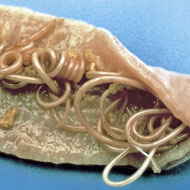Gaps in Toxocara knowledge ‘shocking’, says parasitologist
Calls for One Health approach to research
Parasitologist Celia Holland is calling for an urgent One Health approach to the study of Toxocara and toxocariasis, which she believes have been ‘strangely ignored’.
In a special One Health edition of the journal Parasitology, Professor Holland states that there are at least nine gaps in our knowledge, which she describes as ‘shocking’ considering our knowledge of other major human parasites.
Writing about the paper in a Cambridge Core blog, she says it is ‘inconceivable’ that we do not know which Toxocara species contributes most to human exposure - T. canis or T. cati. Information is still lacking on the relationship between exposure and disease.
With multiple transmission routes, problems with diagnosis and treatment, and widespread environmental contamination, it is challenging to research this helminth and come up with appropriate measures of prevention and control.
But Prof Holland, of Trinity College Dublin, believes this is only part of the problem. The number of researchers who make Toxocara their main focus is on the decline. Several leading figures have retired and renowned parasitologist Huw Smith sadly passed away in 2010. There is a need for new scientists to take up the challenge, she adds.
Prof Holland is calling for an urgent One Health response, initially in a single country or defined region where infection in humans, other animals and the environment can be comprehensively assessed. The relationship between seropositivity in humans and the extent of significant disease should also be explored, as well as the detection of eggs in the environment and larvae in paratenic hosts.
The collection of such data could provide the basis for an intervention study involving anthelmintic treatment and anti-fouling, with subsequent follow up.
Whilst acknowledging that such an approach would be logistically challenging and costly, Prof Holland says this would place Toxocara in a One Health context for the first time, and provide a framework for future prevention and control. She calls on major pharmaceuticals to join the research community by funding a significant One Health research programme.








